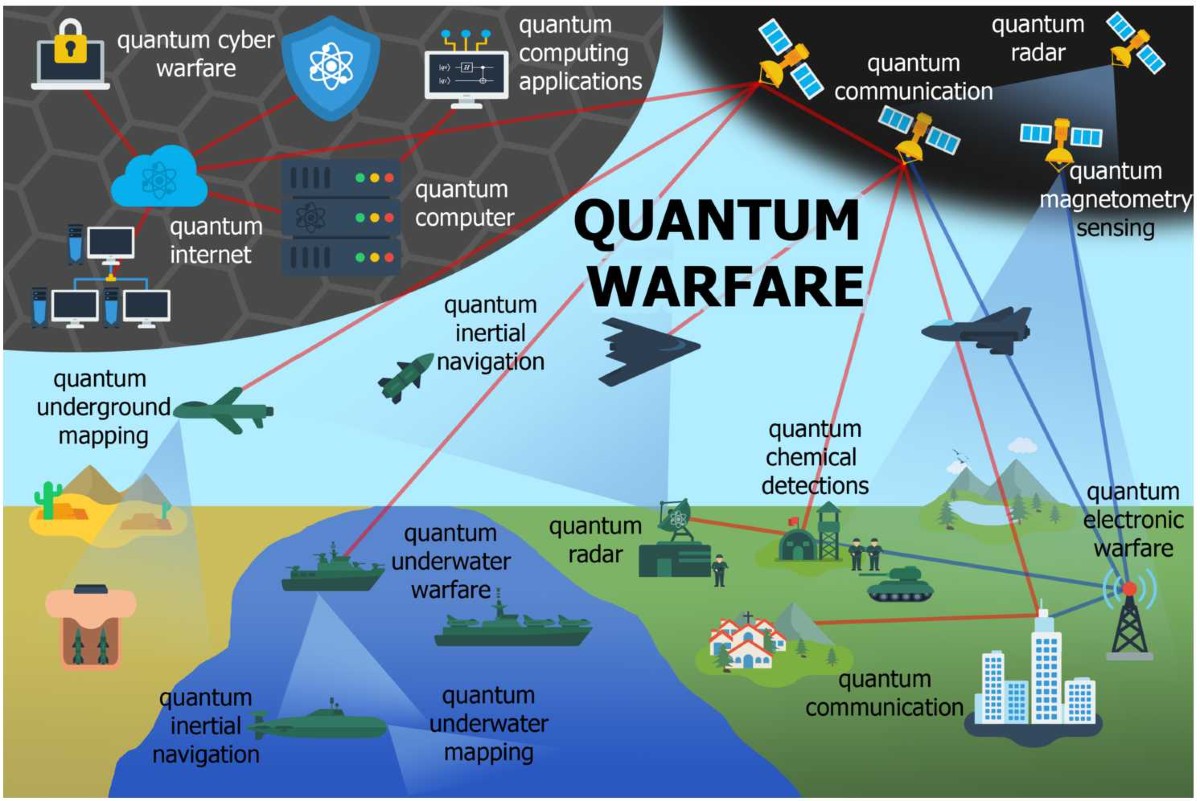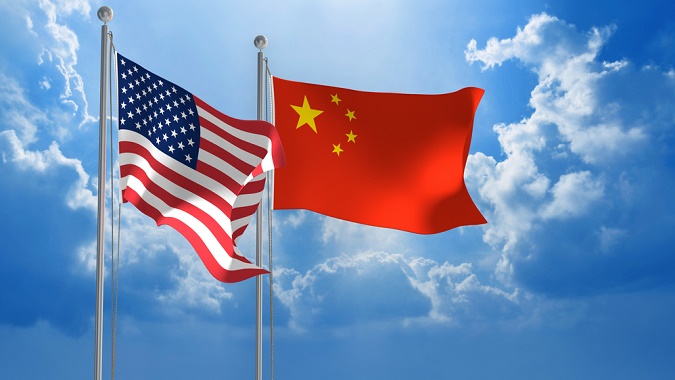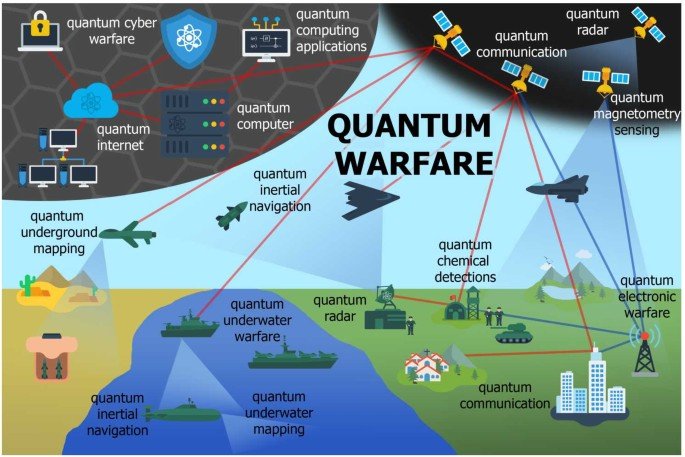Imagine a world where military strategies are no longer bound by the limits of current technology. A world where quantum physics transforms the battlefield, making decisions faster, more accurate, and beyond what we ever imagined.
The “Quantum Military Applications Report” is your gateway to understanding this new frontier. This report explores how quantum technology is set to revolutionize defense systems, giving you insights into its potential to reshape global military power. Are you ready to discover how this cutting-edge science can redefine security and strategy?
As you dive deeper, you’ll uncover the hidden potentials and implications for national and global safety. Don’t miss out on the opportunity to grasp the future of military innovation.
Quantum Technology In Defense
Quantum technology is rapidly becoming a cornerstone in defense strategies worldwide. Its potential to transform military operations is immense, offering unparalleled precision and speed. As nations race to harness these capabilities, understanding its implications becomes vital for anyone interested in global security.
Revolutionizing Military Strategies
Quantum technology is reshaping the battlefield in ways previously unimaginable. Imagine soldiers equipped with devices that provide real-time battlefield analysis, predicting enemy movements with astonishing accuracy.
Quantum computing offers the ability to analyze vast datasets swiftly, aiding in strategic planning and decision-making. This means quicker, more informed responses to threats, potentially saving lives.
Consider the impact of quantum encryption on military communications. With impenetrable security, you can rest assured that sensitive information remains safe from adversaries.
Integration With Existing Systems
The integration of quantum technology into current military systems is a complex but rewarding endeavor. It involves upgrading existing infrastructure to accommodate new capabilities.
Think about how quantum sensors can be added to traditional reconnaissance tools, enhancing their accuracy and reliability. This improves surveillance, giving your forces a significant edge.
But how do you ensure seamless integration? Collaboration between tech experts and military strategists is key. By working together, they can overcome challenges and optimize the use of quantum advancements.
Are you ready to witness a new era of defense strategies? Quantum technology promises transformative changes, making military operations more efficient and effective. As we stand on the brink of this quantum revolution, the question remains: how will it redefine your approach to security?

Credit: www.reddit.com
Quantum Computing For Warfare
Imagine a battlefield where decisions are made in the blink of an eye, data flows seamlessly, and logistics run as smoothly as a well-oiled machine. This is not a futuristic dream but a potential reality with quantum computing in warfare. Quantum computers can process complex calculations at speeds unimaginable with traditional computers. They promise to transform how military operations are conducted, making them more efficient and effective.
Enhanced Data Processing
Data is the backbone of modern warfare. Quantum computing can enhance data processing capabilities, allowing military analysts to sift through vast amounts of information quickly and accurately. Picture yourself in a command center, where decisions hinge on timely intelligence. Quantum computers can provide real-time insights, enabling commanders to make informed decisions swiftly.
Consider the implications of this rapid processing. You could detect threats earlier and respond faster. This means lives saved and missions completed successfully. Have you ever wondered how many lives could be preserved with faster intelligence analysis?
Optimizing Military Logistics
Military logistics is all about getting the right resources to the right place at the right time. Quantum computing can optimize these logistics by solving complex optimization problems. Think about the chaos of moving troops, supplies, and equipment efficiently. Quantum algorithms can streamline these operations, reducing delays and increasing precision.
Imagine a scenario where supplies are needed urgently, but traditional systems face bottlenecks. Quantum computing can break these bottlenecks, ensuring that resources are distributed effectively. Have you ever experienced a delay that cost precious time? With quantum computing, such delays could be minimized.
Your curiosity might lead you to ask, what other areas of warfare could benefit from quantum computing? The potential applications are vast and could redefine military strategy.
Quantum Cryptography
Quantum cryptography is reshaping military communication methods. It uses quantum mechanics principles to secure information. This technology promises unbreakable encryption. Quantum cryptography could soon be essential in defense strategies. It aims to protect sensitive data from cyber threats.
Securing Military Communications
Military communications need robust security systems. Quantum cryptography offers a solution. It uses quantum keys to encrypt messages. These keys are impossible to intercept without detection. Enemy forces find it difficult to breach quantum encryption. This ensures safe communication between military units.
Quantum cryptography strengthens national security. It secures strategic information. This reduces risks of espionage. Commanders can share plans without fear. Troops trust their communications are safe. Quantum methods provide confidence in digital security.
Challenges And Limitations
Quantum cryptography faces challenges. Setting up the infrastructure requires significant resources. This technology is still in early stages. Its implementation is complex. Equipment costs are high. Only advanced nations can afford it.
Quantum systems need precise conditions. They depend on stable environments. External factors can disrupt operations. There are limits to its current capabilities. Scalability is a concern. Expanding quantum networks is difficult.
Despite these challenges, research continues. Scientists work to overcome limitations. They aim for more accessible solutions. Future advancements may lower costs. Quantum cryptography could become widespread. It might transform military communications entirely.

Credit: epjquantumtechnology.springeropen.com
Quantum Sensing And Imaging
Quantum sensing and imaging are reshaping military strategies worldwide. These technologies enhance precision and reliability in challenging environments. They offer unparalleled advantages in surveillance and navigation. Quantum systems provide insights beyond conventional capabilities.
Advanced Surveillance Capabilities
Quantum sensing boosts military surveillance systems. It detects minute changes in the environment swiftly. These systems can identify objects through walls or dense fog. Quantum imaging captures details invisible to traditional sensors. This improves reconnaissance missions significantly.
Detection And Navigation
Quantum technology enhances detection accuracy. It identifies threats with unmatched precision. Navigation systems benefit from quantum advancements. They offer precise location data without GPS reliance. This is crucial in GPS-denied areas. Quantum systems ensure safe and accurate navigation.
Quantum Materials In Weaponry
Quantum materials hold potential in modern weaponry, enhancing stealth and detection capabilities. The Quantum Military Applications Report explores breakthroughs in using quantum properties for advanced military technology. This report highlights innovations that could redefine defense strategies.
Quantum materials are reshaping the future of military technology. With their unique properties, these materials offer new possibilities in weapon development, armor enhancement, and defense strategies. Imagine a world where weapons are smarter and more efficient, and armor is nearly impenetrable. This isn’t science fiction; it’s the potential of quantum materials in weaponry.Development Of Novel Weapons
Quantum materials are paving the way for a new generation of weapons. These materials can change properties under specific conditions, making them ideal for smart weaponry. Picture a missile that adjusts its trajectory in real-time for maximum impact. Military researchers are experimenting with quantum sensors for improved targeting accuracy. In my work with defense technology, I’ve seen firsthand how precise these systems can be. They have the potential to reduce collateral damage and increase mission success rates. The global arms race is taking a quantum leap. Nations investing in these technologies could gain significant advantages. Are you prepared for the implications of such advancements?Impact On Armor And Defense
Armor and defense systems are also benefiting from quantum materials. These materials can create barriers that are both lightweight and incredibly strong. Imagine wearing armor that feels like a second skin but can withstand extreme forces. Quantum coatings could offer new levels of protection against projectiles and energy-based attacks. In my experience, the integration of these materials has already begun to alter military strategies. The ability to absorb and dissipate energy can dramatically improve survivability. The defensive capabilities of quantum materials raise important questions. How will these advancements change the balance of power in global conflicts? Will they lead to a safer world, or simply escalate arms development? Engaging with these questions can help you better understand the future of military technology. As quantum materials continue to evolve, staying informed is crucial. What role do you think these materials will play in the next era of warfare?Potential Threats And Countermeasures
The Quantum Military Applications Report highlights potential threats in quantum technology. It examines risks like data breaches and advanced surveillance. The report suggests countermeasures, including enhanced encryption and robust security protocols, to protect sensitive information and maintain national security.
The Quantum Military Applications Report has opened a Pandora’s box of both immense possibilities and significant threats. As quantum technology advances, the risk landscape broadens, introducing new challenges that could redefine modern warfare. It’s crucial for national defense systems to not only recognize these threats but also develop effective countermeasures.Risks Of Quantum Warfare
Quantum warfare could radically change the dynamics of military strategy. Quantum computers have the potential to break traditional encryption methods, making sensitive communications vulnerable. Imagine a world where state secrets can be decoded in seconds. Are you prepared for a scenario where drone fleets are hacked using quantum algorithms? The battlefield could be manipulated without a single soldier being present. This is not just science fiction; it’s a growing reality. To combat these threats, military organizations must invest in quantum-resistant encryption. Developing systems that cannot be easily cracked by quantum computers is essential. Collaboration with tech companies to advance quantum-safe technologies is equally important.Global Security Implications
Quantum technology doesn’t just threaten individual nations; it poses a risk to global security. If one nation gains a quantum advantage, the balance of power could shift drastically. This could lead to a new arms race, with countries scrambling to develop or counter quantum capabilities. Think about how alliances could be tested. Would your country stand by its allies if quantum supremacy was achieved by a rival state? The implications are far-reaching and could affect global diplomatic relations. To prevent escalation, international regulations around quantum technologies should be considered. Open dialogues between countries can help create frameworks for ethical use. Could these conversations prevent a potential quantum Cold War? The future of warfare may be uncertain, but being proactive in understanding and countering quantum threats is vital. How will you contribute to shaping a secure quantum future?International Quantum Arms Race
The International Quantum Arms Race intensifies as nations explore quantum military applications. A recent report highlights advancements in quantum technology for defense strategies. Countries invest heavily in quantum computing to enhance security and develop cutting-edge systems.
The term “International Quantum Arms Race” might sound like something out of a sci-fi novel, but it’s becoming a reality. Nations across the globe are racing to develop quantum technology for military applications. This race isn’t just about who gets there first; it’s about who can harness the power of quantum computing to gain a strategic edge. Quantum technology promises unprecedented advancements in encryption, radar, and communication. Imagine a world where traditional encryption is obsolete, replaced by quantum key distribution that is nearly unbreakable. That’s why countries are investing heavily in quantum research. The stakes are high, and the outcome could redefine military power.Major Players In Quantum Defense
The United States and China are leading the charge in quantum military applications. Both countries have poured billions into research and development. The U.S. Department of Defense has set up dedicated quantum research labs. Meanwhile, China has launched satellites equipped with quantum technology. Europe isn’t far behind. The European Union has its Quantum Flagship program, aiming to catch up with the U.S. and China. Smaller nations like Canada and Australia are also making strides, focusing on niche areas within quantum technology. The race is intense, but it’s not limited to just a few countries. Even nations with smaller budgets are trying to find their place in this new quantum landscape.Collaborations And Rivalries
While competition is fierce, collaboration is also a key strategy. Countries are partnering with each other and with private companies to accelerate their quantum advancements. The U.S. has teamed up with allies like the UK and Japan to share knowledge and resources. However, not all relationships are harmonious. There are underlying tensions, especially between major players like the U.S. and China. These rivalries could have far-reaching implications for global security. Think about it: if one country gains a significant quantum advantage, what will that mean for the rest of the world? Could it trigger a new form of Cold War, but in the quantum realm? These are questions that policymakers and military strategists are grappling with. As you follow the developments in quantum technology, consider how collaboration and rivalry might shape the future of global security. Are you ready to keep an eye on how this race unfolds? It could redefine the very concept of military power and security in the years to come.Ethical Considerations
As quantum technology advances, its military applications raise ethical concerns. The potential impact on global security and warfare is significant. With great power comes great responsibility. Ethical considerations must guide the use of quantum technology in military contexts.
Moral Implications Of Quantum Warfare
Quantum technology can change warfare’s nature. It offers unmatched precision and speed. But it also raises moral questions. What happens if these technologies fall into the wrong hands? The line between defense and aggression can blur. Ethical guidelines are crucial.
Weapons using quantum technology could lead to unpredictable outcomes. Their impact might be difficult to control. This unpredictability poses moral dilemmas. Should such powerful tools be developed at all? These questions challenge our existing ethical frameworks.
Regulatory And Policy Challenges
Quantum military applications face regulatory hurdles. Existing policies might not cover new quantum technologies. This gap poses significant challenges. Policymakers must adapt quickly to regulate these advancements. They need to ensure global security and ethical compliance.
International cooperation is vital. Nations must work together to create new regulations. These rules should prevent misuse and promote peace. Without clear policies, the risks increase. It’s a delicate balance between innovation and control.

Credit: www.hpcwire.com
Frequently Asked Questions
What Are Quantum Military Applications?
Quantum military applications leverage quantum technologies for defense purposes. They can improve secure communications, radar systems, and cryptographic methods. Quantum computing helps solve complex military problems faster. These advancements enhance operational efficiency and decision-making in military operations.
How Does Quantum Computing Aid Defense Strategies?
Quantum computing aids defense strategies by processing vast data quickly. It enhances encryption and cybersecurity measures, ensuring secure communications. Quantum algorithms help simulate complex scenarios, aiding strategic planning. This technology accelerates problem-solving in logistics and operations, optimizing defense responses.
Why Is Quantum Cryptography Important For Military?
Quantum cryptography is crucial for military as it offers secure communication methods. It uses quantum mechanics to encrypt data, making it nearly impossible to intercept. This ensures confidential information remains protected from adversaries. Quantum cryptography strengthens cybersecurity, safeguarding military networks from potential breaches.
Can Quantum Radar Detect Stealth Aircraft?
Quantum radar can potentially detect stealth aircraft by using quantum entanglement. It offers enhanced detection capabilities even in challenging environments. This technology improves target identification and tracking. Quantum radar helps counter stealth technology, providing better situational awareness in military operations.
Conclusion
Quantum technology holds promise for future military advancements. These applications could improve strategy and defense. Military operations might become more efficient. Communication systems could see enhancements. Quantum computing could help in data analysis. Weapon systems might gain precision. Security measures could strengthen.
These technologies may shift military capabilities. Understanding quantum’s potential is crucial. Its impact might be significant. As technology evolves, military strategies will adapt. Staying informed about these developments is essential. Quantum applications might redefine defense landscapes. The future of military technology looks intriguing.
Quantum’s role could be pivotal.
